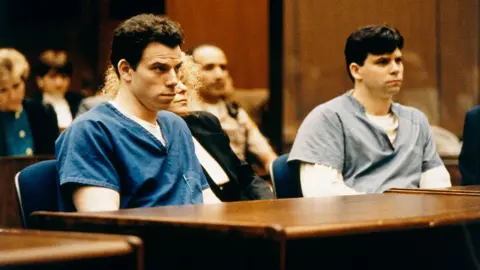**Pop Culture and the Path to Freedom for the Menendez Brothers**
The highly publicized case of the Menendez brothers, Lyle and Erik, continues to captivate public interest and provoke debate as new perspectives emerge nearly 35 years after the tragic events unfolded. In 1989, they horrifically murdered their parents in their opulent Beverly Hills home—a crime initially shrouded in controversy and misunderstanding. Now, after a generation shift fostered by social media platforms like TikTok and streaming productions such as Netflix dramas, the narrative surrounding the brothers is undergoing considerable evolution.
Historically, the brothers were vilified as spoiled heirs who executed a greed-driven plot to eliminate their wealthy parents for inheritance gain. Their case was ridiculed; accusations of sexual abuse made against their father were dismissed and mocked during their trials, which led to their conviction and sentencing to life in prison without parole. Their extravagant spending spree post-murder did not help their reputation. Yet, changes in societal awareness regarding trauma and abuse have led to a growing number of advocates, many of whom are younger individuals who weren’t even alive during the time of the crime, showing empathy toward the Menendez brothers.
Recently, a Los Angeles judge reduced their sentence, paving the way for a potential parole hearing. This could alter their lives drastically, as the final decision regarding their freedom rests in the hands of California’s Parole Board and Governor Gavin Newsom, whose political future might be influenced by this highly divisive case.
The roots of this case delve deep into the tragic history of Erik and Lyle’s upbringing. On that fateful night in 1989, they shot their parents while they were watching television. For months, the case was hushed, as they cleverly crafted an alibi—attending a James Bond film—to deflect suspicion. Their lifestyle became extravagant as they indulged in luxury purchases with the money inherited from their parents’ estate. Eventually, it was their confessions to a psychologist that led to their arrest.
Back then, public perceptions were dramatically different. During their trials, they were portrayed merely as entitled children devoid of remorse for their heinous act. Society had not matured in its understanding of trauma, particularly as it relates to men, which exacerbated their situation. Over the years, their appeals were systematically denied, and public sentiment turned against them, often fueled by late-night comedians who derided their defense as simply an “abuse excuse.”
However, recent cultural lenses have shifted since the #MeToo movement began to advocate for victims of sexual abuse. The reexamination of historical cases, such as that of the Menendez brothers, reveals complexities that were previously overlooked. New documentaries and media portrayals have started to shed light on their claims of abuse and have garnered a more nuanced view of their narrative. Notably, public figures like Kim Kardashian have publicly supported their plea for freedom, causing waves of interest and sympathy.
As the public begins to engage with this case through various media platforms and social discussions, the tides might be turning in favor of the Menendez brothers. They have expressed newfound hope owing to this change in societal understanding of abuse and trauma. Their growth during incarceration reflects positively on their character—both brothers have taken initiatives within the prison system, further demonstrating their commitment to reform.
Looking ahead, the crucial decisions regarding their potential release will significantly depend on Governor Newsom. He faces the daunting task of navigating the political ramifications of allowing the release of men who committed such a notorious crime. Any inclination he shows toward their release could lead to significant media attention that would affect his political future, especially with rumors suggesting he might have presidential aspirations for 2028.
Inside the prison walls, the brothers have shown no tendencies towards violence during their incarceration, focusing instead on personal development and contribution to the community. This is critical, as many factors will weigh into the parole board’s recommendations and the governor’s ultimate decision.
In conclusion, whether the Menendez brothers will truly find freedom after such a convoluted history remains uncertain. However, with changing public attitudes and political considerations weighing heavily on their future, a shift in their fate seems increasingly plausible amid the evolving landscape of societal comprehension of trauma and justice.



